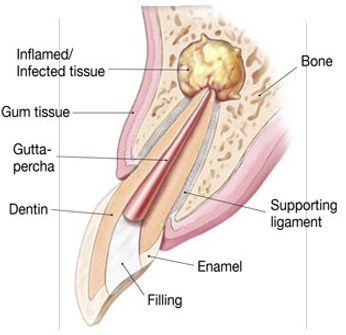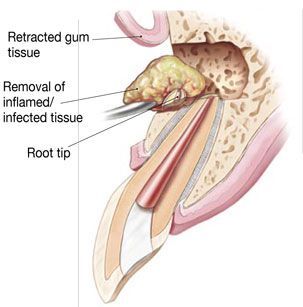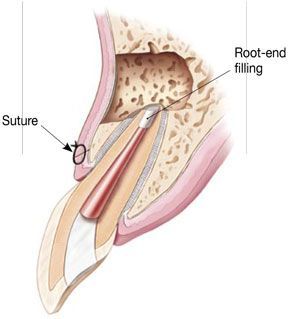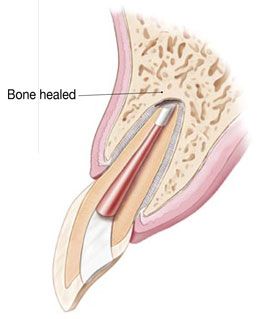|
OUR
Apicoectomy
SERVICES
|
WhAT IS an Apicoectomy?
|
An apicoectomy is a surgical procedure that is performed to treat a tooth that has become infected or inflamed at its root tip. During the procedure, the tip of the tooth's root is removed along with the infected tissue. The root is then sealed to prevent any further infection. This treatment is usually recommended when a root canal procedure has failed or is not an option.
Generally, a root canal is all that is needed to save teeth with injured pulp from extraction. Occasionally, this non-surgical procedure will not be sufficient to heal the tooth and your endodontist will recommend surgery. Endodontic surgery can be used to locate fractures or hidden canals that do not appear on x-rays but still manifest pain in the tooth. Damaged root surfaces or the surrounding bone may also be treated with this procedure. The most common surgery used to save damaged teeth is an apicoectomy or root-end resection. Although there are many surgical procedures that can be performed to save a tooth, the most common is called apicoectomy or root-end resection. When inflammation or infection persists in the bony area around the end of your tooth after a root canal procedure, your endodontist may have to perform an apicoectomy.
Why will I need an Apicoectomy?

The process of an apicoectomy
1.
The doctor performs this micro surgical procedure first making you comfortable by applying local anesthesia before opening the gum tissue near the tooth to see the underlying bone and to remove any inflamed or infected tissue.

2.
The very end of the root is also removed with the infected tissue. A small filling may be placed to seal the end of the root canal and a few stitches or sutures are placed to help the tissue heal.

3.
Over a period of months, the bone heals around the end of the root.

Following the procedure, there may be some discomfort or slight swelling while the incision heals. This is normal for any surgical procedure. To alleviate any discomfort, an appropriate pain medication will be recommended. If you have pain that does not respond to medication, please call our office.
SURGICAL INSTRUCTIONS
|
-
Pre-Surgical Instructions.
You have been scheduled for an endodontic surgical procedure. The surgery will be performed using local anesthesia. Most patients are able to drive home and return to work the following day. Post-operative complications are rare, but swelling and/or bruising may occur. Discomfort after the procedure is minimal, and readily controlled with medications. A doctor is available for consultation, at all times, should a problem arise.
1. Continue all medications for blood pressure, diabetes, thyroid problems and any other conditions as recommended by your physician. If there is a question, please call our office prior to your surgery.
2. If you are on daily aspirin or blood-thinning medication, please inform us so that consultation with your physician about changing the regimen before surgery can be accomplished.
3. Please do not take Aspirin or medications containing Aspirin for one week prior to your appointment.
4. If you have been advised by your physician to use antibiotic pre-medication because of mitral valve prolapse (MVP), heart murmur, hip, knee, cardiac or other prosthesis, or if you have rheumatic heart disease, please make sure you are on the appropriate antibiotic on the day of your surgical appointment.
-
Post-Surgical Instructions
ldo
1. Avoid strenuous exercise for the remainder of the day.
2. Smoking and alcohol consumption delay wound healing and should be avoided for 3 days following surgery.
3. In order to control swelling, place an ice bag over the surgical area-applying and removing at 15-minute intervals for the remainder of the day.
4. Discoloration may appear following the surgery and will gradually disappear. If swelling occurs, it will reach its peak by the 4th day.
5. Slight bleeding can be expected during the first day of surgery. If excessive bleeding occurs place a wet tea bag inside the mouth at the surgical site and press firmly on OUTSIDE of cheek for 30 minutes. Keep head elevated. If bleeding persists, call the office.
6. Do NOT raise the lip to look at operated area. It is possible to tear the stitches accidentally, open the incision and delay healing.
7. Eat a soft diet; mashed potatoes, yogurt, eggs, rice, pasta, etc. Avoid hard, crunchy, or chewy foods until the sutures are removed.
8. Drink plenty of cold liquids. If possible, avoid hot drinks and soup for the first 24 hours.
9. Starting the day after your surgery, use a warm salt-water rinse (1/2 glass of warm water, 1/2 teaspoon salt; repeat 4 or 5 times a day for 2 weeks) or the prescribed mouth rinse (follow directions on bottle), whichever your doctor has prescribed. Rinse gently.
10. For control of inflammation and pain, take 600mg of Ibuprofen (Advil, Motrin, or Generic) every 6 hours for 3 days following your procedure. If you cannot take NSAIDS (Aspirin, Ibuprofen, or Naproxen) or if you are allergic to Aspirin, take 1000 mg of Tylenol every 4-6 hours as needed for pain for 3 days.
11. Take your prescribed antibiotic as directed.
12. Return to the office as pre-arranged by appointment, approximately 7 days after surgery.
13. If any unusual symptoms develop, please contact our office for advice or further instructions.

